
The integration of Artificial Intelligence (AI) into business operations has unlocked a plethora of opportunities for innovation, efficiency, and growth. However, as AI becomes more embedded in the fabric of business processes, the importance of navigating its ethical implications cannot be overstated. Ethical AI use ensures that technology not only serves to advance business objectives but also upholds the values of fairness, transparency, and accountability. This post explores the critical aspects of ethical AI use in the business world today.
AI Ethics Matter
Ethical AI safeguards fairness, accountability, and transparency.
Business Responsibility
Companies must ensure AI respects user rights and privacy.
Understanding Ethical AI
Ethical AI encompasses the development and application of AI technologies in a manner that respects human rights and values. It involves creating algorithms that are transparent, fair, and unbiased, ensuring that AI acts in the best interest of humanity. For businesses, this means implementing AI solutions that do not discriminate based on gender, race, or other personal characteristics. Ethical AI also prioritizes the security and privacy of user data, ensuring that personal information is protected and used responsibly. By adhering to these principles, businesses can harness the power of AI while maintaining trust with their customers and the broader public.
The Role of Businesses in Promoting Ethical AI
Businesses have a pivotal role in ensuring the ethical use of AI. This responsibility starts with the acknowledgment that every AI application has the potential to impact society positively or negatively. Companies must adopt a proactive approach to ethical considerations, integrating them into the initial design and development phases of AI projects. This involves conducting thorough impact assessments to understand how AI solutions might affect various stakeholders and taking steps to mitigate any adverse effects. Businesses can also contribute to ethical AI by promoting transparency, offering clear explanations about how AI systems make decisions, and allowing users to opt-out of AI-driven processes if they prefer.
Addressing Bias in AI Algorithms
Bias in AI algorithms is a significant concern that can lead to unfair outcomes for individuals or groups. Biased algorithms can perpetuate and even amplify existing societal inequalities. To combat this, businesses must ensure that the data used to train AI systems is diverse and representative of all segments of society. This might involve collecting more inclusive data or developing techniques to identify and correct biases in existing datasets. Additionally, companies should implement ongoing monitoring and testing of AI systems to detect and address biases as they evolve.
Regulatory Compliance and Ethical AI
Navigating the regulatory landscape is a critical aspect of ethical AI use. As governments around the world begin to introduce laws and guidelines governing AI, businesses must stay informed about these developments and ensure their AI applications comply. This can be challenging, given the fast-paced evolution of AI technology and the varying regulatory frameworks across different jurisdictions. However, compliance is not only about adhering to legal requirements; it’s also an opportunity for businesses to demonstrate their commitment to ethical practices and build trust with consumers and regulators alike.
Building Trust Through Ethical AI
Trust is the foundation of any successful business-customer relationship, and ethical AI use is key to maintaining and strengthening this trust in the digital age. Businesses that transparently use AI, prioritize user privacy, and demonstrate a commitment to fairness and accountability can differentiate themselves in the marketplace. Such companies are likely to enjoy higher levels of customer loyalty and brand reputation. Moreover, by leading with ethical AI practices, businesses can contribute to a more positive societal perception of AI technology, encouraging its acceptance and use.
As we delve deeper into the age of artificial intelligence, the imperative for ethical AI use becomes increasingly paramount. Navigating the complexities of ethical AI is not merely about compliance or avoiding negative consequences; it’s about fostering an environment where technology serves humanity in respectful, fair, and accountable ways. Businesses have the opportunity and responsibility to lead by example, demonstrating that it is indeed possible to harness the power of AI while upholding the highest ethical standards.
We invite you to share your thoughts, experiences, or questions about ethical AI use in the business world. How do you see these practices evolving, and what steps is your organization taking to ensure ethical AI use?






